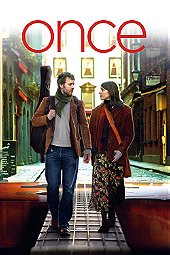Just like Before Sunrise, a new classic directed by Richard Linklater, Once is a magical film that through its narrative apparently simple, reaches a victory that escapes most films of the same genre, picturing with authenticity and feeling the precise instant in which two human beings find themselves in love for each other. The difference here is that when Ethan Hawke and Julie Delpy were seduced by the long conversation they kept, here, is the music that puts "Guy" and "Girl" together, magnificently played by Glenm Hansard and Markéta Irglová, and the fact that we never hear their names of the two characters makes this newly discovered love even more universal, something that can be easily related by the audience.
Not exactly with his ego in the best of shapes since he was abandoned by his girlfriend, Guy divides his time between his father's small repair shop, in which he works fixing vacuum claners, and his presentations in the streets of Dublin when he sings for some extra change. That's when one of his compositions gets the attention of Girl, a simple Czech immigrant, who learned to play the piano with her father, and now lives of selling flowers and housekeeping. Music lovers, they quickly begin a strong connection between Guy's songs, who decides to make a demo CD with Girl's help.
Shot in only 17 days with a digital camera, Once has a simple photography, not too fancy, what gives a huge authenticity to the story. It also has several plans shot in the streets of the Irish capital, when the camera is placed in a distance not to catch the attention of the people passing by, who ignore the presence of the actors, the film ends up having a tone almost documental, something also brought up by its cuts, basically dry, resulting in sudden ellipsyses, yet, they are more than adequate to the language adopted by director John Carney.
The same way, though the frameworks and the camera movements aren't the most engenious, it's impossible top deny the effectiveness that serve the narrative. For example, the scene where the couple plays together for the first time in a music store: initially, the camera keep its distanceas Guy observes, fascinated, girl playing the piano. In this instant, the camera approaches the duo, also moving down together with Hansard, whon kneels by the girl, and it is right there, in this small and intimist travelling that we can notice that Guy begins to fall in love with Girl. From then on, they begin a song and shortly after all that, the picture becomes much more closed approaching each other even more (and it's simply perfect that the frsty verses that Hansard sings in this sequence are exactly: "I don't know you/but I want you all the more for that" that belongs to the music "Falling Slowly", end up becoming the symbol of that relationship, and heard again (properly) in the end of the film.
Besides, the logic that Carney places Hansard and Irglová's songs is impecable: though they appear in an organic way, being executed in front of the cameras by the two, the last seconds of each song fit as background for the action in the next sequence, as the characters are creating the soundtrack for their own lives, in a certain moment, this becomes particularly clear as we see Guy singing as he watches a video of his ex-girlfriend. There's also a touching dramatic irony in the fact that Girl lends her voice with so much sweetness to the songs that, ultimately, Guy made for his ex-girlfriend.
In her first acting job, young singer and composer Markéta Irglová gives a performance worthy of a veteran, showing with sentivity the insecurities of an immigrant that, win her early twnties has to support her mother and her daughter, the girl gradually reveals an unsuspected force that turns into the impulse that was missing for Guy to finally make come true his artistic vein. As an opposite to Guy's impulsiveness, Girl never loses her own responsabilities from sight, and it's heart breaking to see her diligently tidying up her house after a long day or even realize the way she brings Guy back to reality after being invited to go with him to London, needing for that, to make him only one question: "Can I take my mother?". the same way is revealing the way she reacts, offended, to the Guy's first tries to sleep with her. Clearly interested in him, Girl is not exactly offended with the cheap line, but with the implication that it brings: that he had underestimated her terribly.
Meanwhile, Hansard (with his worn out guitar, broken and with the strings hanging around) opens a window for Guy's romantic and kind nature, through his songs: giving himself with so much intensity to them, he seems to suffer a lot with each verse and his voice overloaded with feelings makes a perfect match to the apparent frailty and the charming sweetness of Girl's completes the harmonies of the songs. The chemestry between Hansard and Irglová is so beliaveble, making even more clear thanks to the naturality in which the couple comes up playing around the motorcycle or arguing about love frustrations. And if we consider the story between the two that begins and grows through the music is only natural that she sums up the fight she had with the father of her daughter when she reveals that he didn't apreciated her compositions.
Bringning almost 20 songs (all of them very beautiful) Once is impecable to the last second, closing its narrative in an absolutely perfect way when it focuses the eye of a dreamer, who, without taking the heavy weight of a difficult reality off his back, the film can still find room for hope or at least for a sweet and sour melancoly that comes up as the result of all the unconsumed love between the main couple.
9/10
 Login
Login